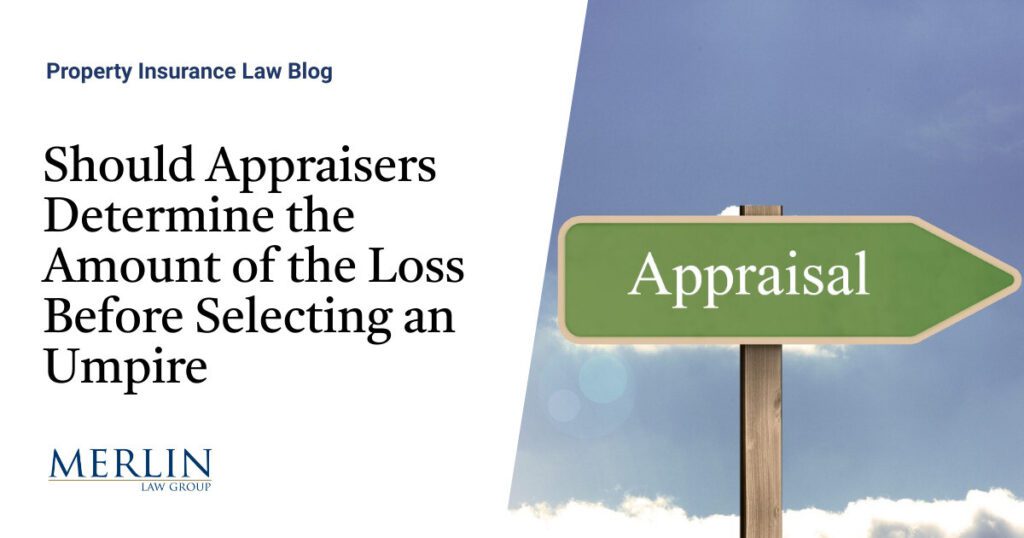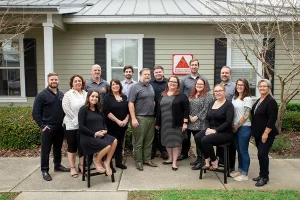Should Appraisers Determine the Amount of the Loss Before Selecting an Umpire?

The standard property insurance policy requires the appraisers to first select an umpire before doing anything else. Why? Would it be better for the appraisers first to do the hard work of determining the amount of loss and seeing if they can agree to the amount before selecting an umpire, or do both simultaneously? Before Steve Badger and others guess about the right answer to the first question without doing historical research definitively explaining why appraisers should first pick umpires before doing anything else, I would suggest everyone think deeply about the answer posed by my second question.
I cannot tell you how often pseudo-insurance coverage nerds rattle off reasons for why policy language exists and are simply guessing at historical history, which is not truthful or supported. It simply fits their argument. So, for a third question, does anybody have historical evidence as to why we pick umpires before appraisers do anything else?
After reading a LinkedIn post by Toby Johnson, this post came to mind, which stated in part:
Let me share a personal experience of a good appraisal process. Several years ago, I was hired as an expert for a significant hail loss in West Texas. The carrier also hired a very well-known engineer who has written many storm damage-related publications over the years (everyone reading this is familiar with his work). We agreed on 95% of the buildings; however, we had differing opinions on the largest and most expensive roofing system. The attorneys for the case decided that appraisal would be a better option than litigation. They decided to appoint the very experts who had previously provided conflicting reports on the matter as their appraisers.
Now, you may be thinking, someone ‘who already has an opinion before appraisal cannot act as an impartial appraiser.’ It’s a valid concern, one that’s been addressed by esteemed professionals like Chip Merlin and Steven Badger here: https://lnkd.in/e54epQZs
Now, to be fair, I was not optimistic that we would agree on an umpire or the day of the week, much less the amount of the loss. To my surprise, the other appraiser was very friendly and reasonable. Our discussions quickly became amicable, and by the end of the phone call, we mutually agreed that we would take a second look at the damage with the goal of resolution in mind. Two weeks later, after another phone call, we had worked out a scope and value to remedy the damage to the roofing system in a fair and equitable manner for both parties. We signed the award with no umpire, no fighting, and no gamesmanship. Just two professionals who took the time to listen to each other with the goal of getting it right. There are many on both sides who would never entertain the idea of having prior experts serve as appraisers; however, with the right professionals, a fair resolution is possible.
The appraisal process is not broken; it just needs positive attention displayed by those who strive for integrity.
The new State Farm insurance policies require appraisers to attempt to reconcile matters before appointing an umpire. I have no idea why State Farm Scriveners did this. I will ask in a deposition and try to share that in the future unless others know the answer.
A 2007 article from IRMI, Demystifying Appraisal: Getting through the Process, notes the following:
Choosing the Umpire
Under most policy appraisal provisions, the two party-appointed appraisers are supposed to select the umpire. It is more likely that the appraisers will be able to agree on an umpire before they actually sit down to try to narrow the substantive disputes. If the umpire can be selected early in the process, the appraisers can also consult with the umpire on the protocol they will follow, the nature of the hearing which will be allowed, and, sometimes, resolution of preliminary issues or even the differences between the appraisers as they come up.
This last point is particularly important in a large complex loss. In such a situation, it is beneficial to have an umpire appointed early on and keep the umpire involved and apprised from the beginning because it is much easier for the umpire to get up to speed and stay on top of things, as opposed to having everything dumped in his lap when it is time to reach resolution.
If the appraisers cannot agree on an umpire, one party petitions the court, and the umpire is appointed by whatever motions judge happens to hear the motion. The latter method is, in this author’s experience, the worst possible way to select an umpire. In most such cases, the umpire is almost invariably a friend of the appointing judge, frequently has no experience in property insurance, and almost never has any experience (much less expertise) in construction, engineering, or time element analysis.
Given how judges frequently pick umpires, selection of an umpire is fraught with a certain amount of peril, particularly in hotly disputed, complex losses. Therefore, the parties would be well advised to agree on a protocol for selection of an umpire. This should, at the least, include an agreement that no candidate for umpire be contacted by one side without the other. It would be helpful if the parties could agree on a proposed letter to a candidate advising that she is being considered, along with an agreed description of the subject matter of the appraisal, a list of the involved parties so the umpire can run a conflict check, and suggested dates and times for a joint conference call. If this procedure is followed, umpire interviews should be conducted with both appraisers on the line.
The goal should be to either select an umpire with this process, or reach agreement on a short list of qualified candidates from which a judge can be asked to select. If the judge picks from the proposed list, at least the umpire will be qualified, even if not completely satisfactory to one or both of the parties.
But why shouldn’t the selected appraisers start doing their other jobs, determining the amount of loss and coming to agreements, without waiting for the selection of the umpire? It would seem to speed the appraisal process along. As noted in last week’s post, Who Would You Pick as the Umpire If You Were the Judge, it can take months or even more than a year to get an umpire selected. Why not move the matter along by allowing or demanding that the appraisers start appraising?
Thought For The Day
Continuous improvement is better than delayed perfection.
—Mark Twain

